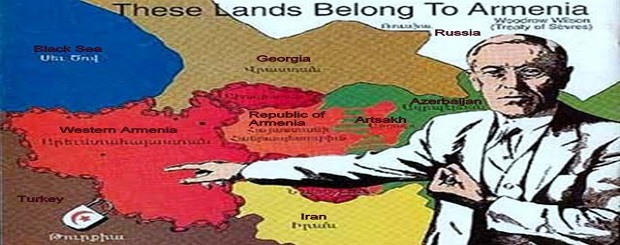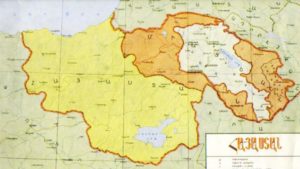
Stanislav Tarasov: “The shadow of the Treaty of Sevres looms over the Middle East”
July 25, 2019 – /ORIGINE SOURCES-parliament-wa.info/ru/archives/10803/
annotation
In the Middle East, the game is played through a mass of historical plexuses with their projection onto the current situation. If the Turks do not want to be pawns in this game, they need to get out of the fairway of American policy, begin to build relations with Damascus, first of all agreeing with the Syrians about an acceptable option for joint actions. And the sooner the better.
Turkish Foreign Minister Mevlüt авavuşoлуlu, commenting on recent talks with US Special Representative for Syria James Jeffrey, said that the parties “did not reach an agreement on the creation of a security zone in northern Syria”, and the withdrawal of Kurdish National Self-Defense detachments from this territory was not agreed .
“Turkey’s patience is running out,” Cavusoglu stressed. “Despite the past year and one month, the“ road map ”in connection with the Syrian region of Manbidj is still not created.” And not only this. Ankara accused Washington of carrying out a “policy of insincerity”: on the day of talks with Jeffrey, the head of the US Central Command, Kenneth MacKenzie, met with one of the leaders of the Popular Self-Defense Forces, Shahin Djilo. The Kurdish spokesman warned that “she could launch an operation in the east of the Euphrates,” which the United States does not want to allow, which, according to the Turkish edition Habertürk, believes that “the Turks should not be concerned about the position of the Kurds in this part of Syria.”
Recall that in 2017, on the initiative of the Americans, the so-called “Democratic Federation of Northern Syria” was established in the Syrian provinces of Haseke, Raqqah and in the eastern part of Deir ez-Zor province, which is estimated by many experts to build power structures independent of Damascus. Commenting on this situation in February 2019, Russian Foreign Minister Sergey Lavrov said that Washington “is trying to form a quasi-state on the eastern bank of the Euphrates under the pretext of fighting terrorism, wants to split Syria,” supporting the Kurds, “is trying to prevent the Syrian government from returning to the eastern bank of the Euphrates “. But at the same time, Lavrov, perhaps for tactical reasons, avoided the question that the creation of Kurdish autonomy “east of the Euphrates, south of the southern border of Armenia, which can be determined later, and north of the border of Turkey with Syria and Mesopotamia” provided for by Article 62 of Part III of the Treaty of Sevres, signed in August 1920.

True, it was in his English edition. This treaty, which never actually entered into force, de jure completely ceased to operate after the revision of its terms during the 1923 Lausanne Conference. But the shadow of Sevres is always vital and hovers over Turkey. Because if the United States implements the plan for the emergence of the Kurdish state east of the Euphrates in Syria, the process of restoring the Treaty of Sevres could begin, which, by the way, provided for the transfer of 103,599 square meters Turkish territories to Armenia. km: two thirds of the vilayets Van and Bitlis, almost the entire wilayet of Erzurum, most of the vilayet of Trebizond, including the port. At the same time, united with the Republic of Armenia that existed in the Transcaucasus, the united Armenian state would have a total area of over 150 thousand square meters. km with access to the Black Sea. And further. The historiography of Kurdistan describes how, after the end of the First World War, point 9 was implemented by the initiative of US President Woodrow Wilson to correct the borders in the Middle East.
This took into account the desire of the Arabs to create their own national state in the territories previously controlled by the Ottoman Empire. Provision was made for the voluntary relocation of Turks and Armenians from the border triangle zone between Armenia, Persia and Mesopotamia. The province in Syria was designated “with a population of about one and a half million almost exclusively Kurds.” Then these processes, which did not affect everyone, began to be carried out in accordance with the Treaty of Lausanne: almost 2 million people were forcibly resettled: about 1.5 million Christians, mostly Greeks, left Turkey, about 0.5 million Muslims were evicted from Greece Turkey That is why the Turkish edition Yeni Çağ writes that “Ankara will fight to the last not to“ let out the Sevres gin from the bottle ”and not allow the Kurdish state to appear in Syria.
According to the publication, if Turkey decides on a military operation east of the Euphrates, it will be “not so much an antiterrorist operation against the Kurdistan Workers’ Party (PKK), but a war against the United States in order to disrupt their geopolitical plans.” The intrigue here is that the Americans are losing the opportunity to maneuver between their two allies – the Turks and the Kurds. Washington will be forced to reveal their cards. If the stake is placed on the Kurds, if they are used solely as a geopolitical project to tame the ambitions of Turkey, they drag out the Syrian conflict, disrupt the possibilities of its political settlement – this is one thing. If Washington took a course on geopolitical fragmentation of Turkey, which will affect not only the entire region of the Middle East, but also the South Caucasus, then it is necessary to be ready for new unexpected shocks.
But be that as it may, there are still managed processes, when the game is played through a mass of historical plexuses with their projection onto the current situation. If the Turks do not want to be pawns in this game, they need to get out of the channel of American politics and begin to build relations with Damascus and first of all agree on an acceptable option for joint actions. And the sooner they do it, the better it will be, first of all, Ankara.
Stanislav Tarasov, Chief Editor of the REGNUM Oriental Edition
Source: REGNUM
